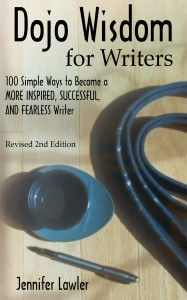Know your target
Today’s guest post is excerpted from the just-released Dojo Wisdom for Writers, Second Edition, by Jennifer Lawler. She’s the author or co-author of more than 30 nonfiction books as well as 16 romance novels under various pen names. Her publishing experience includes stints as a a literary agent and an acquisitions editor. Jennifer also offers classes in writing book proposals, planning a nonfiction book for self-publishing authors, and writing queries and synopses for novelists. Learn more on her website.
Know your target
By Jennifer Lawler
A martial artist must know what he is trying to achieve with every technique.
When he trains, he doesn’t just slice the sword through the air, but he practices against a target so that his aim is true. When he delivers a kick, he knows whether he’s aiming for the knee or the ribs.
He knows what he hopes to accomplish with a specific fight or a specific battle—he knows what his objective is. In a sparring match, it might be to score more points than the opposing fighter. It might be to pin the opponent to the mat.
The martial artist also knows the vulnerable points or weak spots on an opponent’s body. The martial artist always considers his target as he trains.
And so must the writer
The writer must be the same way. You must understand what you’re trying to do and what you hope to accomplish.
This goes beyond “I want to make a living with my writing” or “I want to publish my first (or tenth) novel by the end of the year.” It means if you’re writing for an audience of mystery fans, your novel should have some mystery in it. If you’re writing nonfiction, you need to know what your audience wants from your article or book. If your audience is young adults, you’ll use different language than you would for older adults.
If your audience is technically proficient in the subject matter, you’d probably use more jargon and define fewer concepts than if you were writing an introductory piece for people with no background in the subject matter.
In short, you must know your target to write effectively.
Here’s an exercise for you
For the next piece of writing you do, create a profile of your target.
 To whom will you be writing? Don’t go with the vague, anonymous, “general adult reader.” What are their specific characteristics? Will your readers be men or women, adults or children? What are their ages? If they’re adults, are they married, single, divorced? Do they have children? What ages are their children? What are their interests and hobbies? Where will you find them?
To whom will you be writing? Don’t go with the vague, anonymous, “general adult reader.” What are their specific characteristics? Will your readers be men or women, adults or children? What are their ages? If they’re adults, are they married, single, divorced? Do they have children? What ages are their children? What are their interests and hobbies? Where will you find them?
This profile can be extremely difficult for beginning writers to envision, but since the target shapes your writing, it’s important to have clear, precise knowledge of the target.
Having created this profile, you can then use it as a guide to reaching the audience. You can use techniques that show the audience you know their problems and concerns and that you identify with them. If you’re writing a magazine article on health care, and you know that your target audience is married women with children, you can connect with them by mentioning your own husband and daughter and your concerns about their health.
Having this specific audience in mind also helps you write to them in a way they will find meaningful and accessible.
If you write for a living — or plan to — grab your copy of Dojo Wisdom for Writers, Second Edition. For more information on target audience, read “How to find your book’s target market” and “Finding your novel’s target market: 7 keys hidden in your story” on this blog.
Is it easy or hard for you to identify your book’s target audience?
Like what you’re reading? Get it delivered to your inbox every week by subscribing to the free Build Book Buzz newsletter. You’ll also get my free “Top 5 Free Book Promotion Resources” cheat sheet immediately!


Interests and hobbies is critical in the marketing phase. For example, if your main character is a jiu jitsu master, the book will appeal more to martial arts fans. Suddenly dojos become a viable sales point, transcending genre and age and gender. Same goes for dancing, hunting, stock car racing… whatever.
So true, David. Smart novelists like you know that they have to mine their manuscripts for details like these that give them opportunities to connect with readers.
Thanks!
Sandy
What Sandra said! I think novelists can have difficulty with targeting their audience because they think of it as being so general–“My audience is people who read fiction.” But where do you find “people who read fiction”? You can find “people interested in the martial arts” a lot easier!